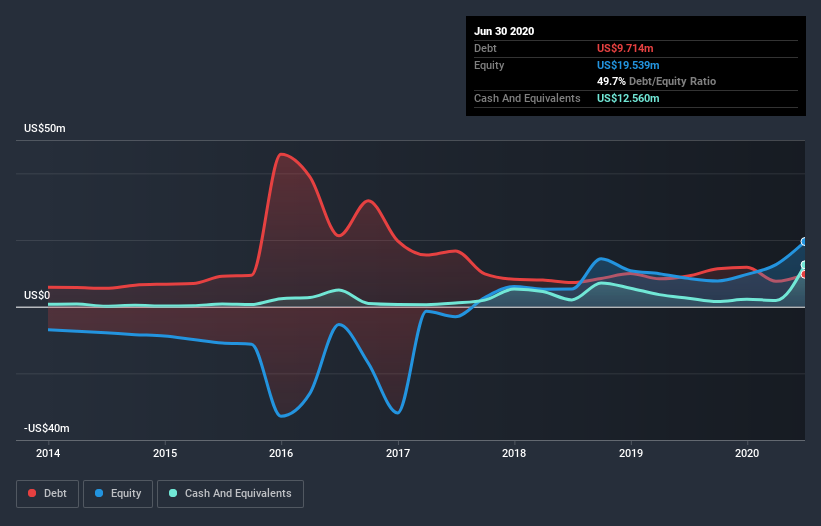Is Dolphin Entertainment (NASDAQ:DLPN) Weighed On By Its Debt Load?
Some say volatility, rather than debt, is the best way to think about risk as an investor, but Warren Buffett famously said that 'Volatility is far from synonymous with risk.' It's only natural to consider a company's balance sheet when you examine how risky it is, since debt is often involved when a business collapses. We note that Dolphin Entertainment, Inc. (NASDAQ:DLPN) does have debt on its balance sheet. But should shareholders be worried about its use of debt?
Why Does Debt Bring Risk?
Generally speaking, debt only becomes a real problem when a company can't easily pay it off, either by raising capital or with its own cash flow. If things get really bad, the lenders can take control of the business. However, a more common (but still painful) scenario is that it has to raise new equity capital at a low price, thus permanently diluting shareholders. Having said that, the most common situation is where a company manages its debt reasonably well - and to its own advantage. When we think about a company's use of debt, we first look at cash and debt together.
Check out our latest analysis for Dolphin Entertainment
What Is Dolphin Entertainment's Net Debt?
You can click the graphic below for the historical numbers, but it shows that as of June 2020 Dolphin Entertainment had US$9.71m of debt, an increase on US$9.21m, over one year. But it also has US$12.6m in cash to offset that, meaning it has US$2.85m net cash.
A Look At Dolphin Entertainment's Liabilities
According to the last reported balance sheet, Dolphin Entertainment had liabilities of US$18.4m due within 12 months, and liabilities of US$11.8m due beyond 12 months. Offsetting this, it had US$12.6m in cash and US$2.55m in receivables that were due within 12 months. So its liabilities total US$15.1m more than the combination of its cash and short-term receivables.
This deficit is considerable relative to its market capitalization of US$22.4m, so it does suggest shareholders should keep an eye on Dolphin Entertainment's use of debt. This suggests shareholders would be heavily diluted if the company needed to shore up its balance sheet in a hurry. Despite its noteworthy liabilities, Dolphin Entertainment boasts net cash, so it's fair to say it does not have a heavy debt load! There's no doubt that we learn most about debt from the balance sheet. But it is future earnings, more than anything, that will determine Dolphin Entertainment's ability to maintain a healthy balance sheet going forward. So if you want to see what the professionals think, you might find this free report on analyst profit forecasts to be interesting.
Over 12 months, Dolphin Entertainment saw its revenue hold pretty steady, and it did not report positive earnings before interest and tax. While that's not too bad, we'd prefer see growth.
So How Risky Is Dolphin Entertainment?
By their very nature companies that are losing money are more risky than those with a long history of profitability. And the fact is that over the last twelve months Dolphin Entertainment lost money at the earnings before interest and tax (EBIT) line. And over the same period it saw negative free cash outflow of US$985k and booked a US$1.7m accounting loss. Given it only has net cash of US$2.85m, the company may need to raise more capital if it doesn't reach break-even soon. Summing up, we're a little skeptical of this one, as it seems fairly risky in the absence of free cashflow. When analysing debt levels, the balance sheet is the obvious place to start. However, not all investment risk resides within the balance sheet - far from it. Like risks, for instance. Every company has them, and we've spotted 4 warning signs for Dolphin Entertainment (of which 1 doesn't sit too well with us!) you should know about.
If, after all that, you're more interested in a fast growing company with a rock-solid balance sheet, then check out our list of net cash growth stocks without delay.
This article by Simply Wall St is general in nature. It does not constitute a recommendation to buy or sell any stock, and does not take account of your objectives, or your financial situation. We aim to bring you long-term focused analysis driven by fundamental data. Note that our analysis may not factor in the latest price-sensitive company announcements or qualitative material. Simply Wall St has no position in any stocks mentioned.
Have feedback on this article? Concerned about the content? Get in touch with us directly. Alternatively, email editorial-team@simplywallst.com.

 Yahoo Finance
Yahoo Finance 
